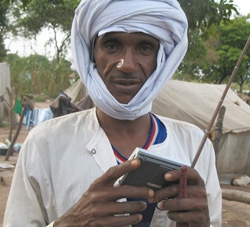
Contact: Megan Fowler, Communications Manager, Refugees International, 202-828-0110, ri@refintl.org
WASHINGTON, Jan. 4 /Standard Newswire/ -- Insecurity and abuse in the northwest of the Central African Republic prompted approximately 50,000 Central Africans to flee into southern Chad. Most of the refugees stated that they had been targeted by at least two of the three armed forces --- rebels, government forces, and bandits --- that take advantage of the lawlessness and extort money from the civilian population. When people cannot pay the requisite sum, they may lose their life or the life of a loved one. In Chad, refugees are not asking for much --- they want to meet their basic needs such as food and education for their children. Though there are few humanitarian organizations in southern Chad, and funding is often in short supply, aid agencies provide refugees with shelter, food, cooking supplies, and now some agricultural assistance so that they can grow food for themselves.
"We fled CAR [the Central African Republic] because of two threats," stated one young man who lives in a refugee camp in southern Chad. The first threat is the rebels in CAR. They kidnap family members, often children, and then demand outrageous sums of money. If one does not pay the ransom within the designated timeline, the rebels may kill their hostages. In his case, rebels demanded one to two million CFA (approximately 2,000-4,000 USD). His family had to sell all of their cattle to pay the ransom. While in the bush with the rebels, his family members were forced to be porters.
"The other threat is the CAR national army." He explained that one of his brothers was imprisoned for one year and three months by the army. He does not know why he was imprisoned, but the army seems to suspect that everyone living in the northwest is a rebel. Although his brother was released from prison, their father was taken by the army for a year and then he was executed. For these reasons, his family "fled in all directions and then met in Chad." He is frustrated and worried about the future since the family has no more cattle and cannot find work in Chad.
A widow with four children said that she will stay in the refugee camp in Chad because the "children are scared that they will be taken away by armed bandits and rebels in northwest CAR who steal children, money, and cattle." She explained that she had been in the camp for three months, but struggled to feed her children. Nomadic cattle herders eat primarily meat and milk, so she said that they are suffering because this is not provided in the refugee camp. However, she also stated that "the situation here is better than in our home" and "the children are happy to be here."
Refugees International met with an elderly man who had arrived at a refugee camp the previous day. He left CAR because he had been arrested by the army. When asked why he was imprisoned, he said, "The local authorities just arrest people and you must pay a lot or they'll tax you for how many cattle you have. For example, if you have a lot of cattle, then you must pay one million CFA (about 2,000 USD)." After being released from prison, he went to hide in the bush with his animals. However, there are "attackers in the bush that come at any time and take children for ransom." If you do not pay, you will be beaten or your child will be killed. He heard that there was "a camp in Chad that's peaceful," so he left CAR with his eight children. He said that they are fine in Chad and his strongest desire is for all of his children to go to school.
In the last year, the water supply has increased and sanitation has improved in southern Chad. However, the UN High Commissioner for Refugees expects many more thousands of refugees to come into Chad. What is needed now is more funding so that aid workers can provide life-saving services to the refugees. In addition, Refugees International spoke with many aid workers who stated emphatically that more international humanitarian agencies are needed in southern Chad. In particular, people emphasized that UNICEF should provide education and other support to refugee children. The fighting in northwest CAR will continue for the foreseeable future—therefore, donors should provide the necessary funding to help the refugees in Chad get back on their feet until they can safely return home.
Sayre Nyce and Yemisrach Benalfew recently completed an assessment in the Central African Republic and southern Chad.





 Sign Up to Receive Press Releases:
Sign Up to Receive Press Releases: